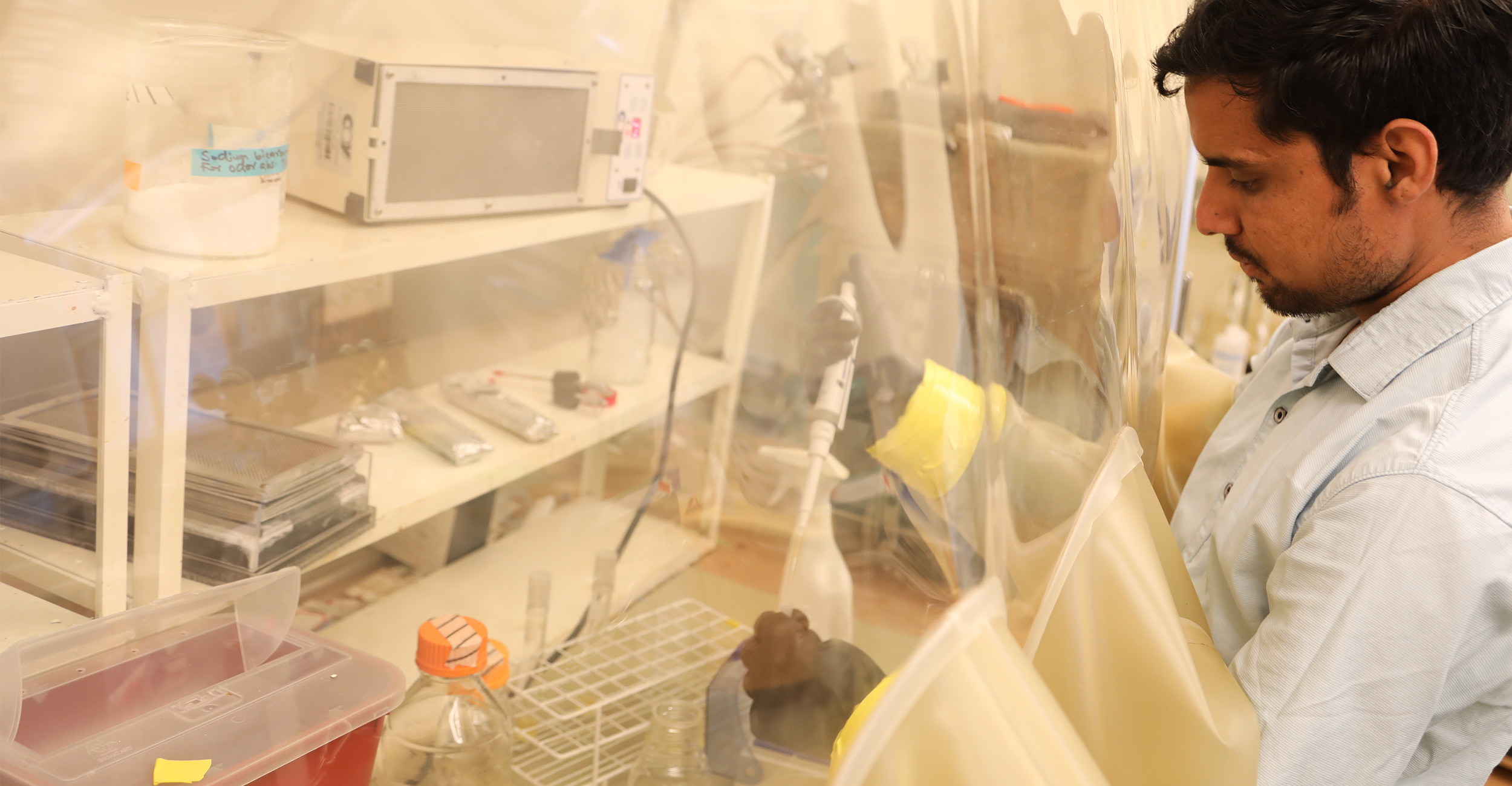
Co-fermentation process making significant strides in biofuel research
Monday, July 1, 2024
Media Contact: Tanner Holubar | Communications Specialist | 405-744-2065 | tanner.holubar@okstate.edu
Researchers in the College of Engineering, Architecture and Technology at Oklahoma State University continue to refine a co-fermentation process resulting in the production of butanol, a biofuel made from renewable resources that can be converted into jet fuel.
OSU received a patent in November 2021 for a co-fermentation process, developed by Dr. Hasan Atiyeh, professor of biosystems and agricultural engineering.
In this process, sugars are converted into alcohols, organic acids and ketones through fermentation. Gas-fermenting bacteria are introduced to capture carbon dioxide, which is also fermented to increase biofuel production. This co-fermentation method reduces environmental impact compared to fossil-fuel based butanol.
The method involves adding natural bacteria to ferment sugars derived from plant materials. It combines sugar-fermenting and gas-fermenting bacteria, capturing carbon dioxide, which is also fermented to create more biofuels.
Atiyeh said traditional fuel and chemical production from fossil fuels results in significant environmental impacts, producing greenhouse gas emissions and leading to high levels of carbon dioxide and other pollutants. Extraction and processing of fossil fuels contribute to soil, water and air pollution, and habitat destruction. Over the past two years, significant advancements have been made in the co-fermentation process.
"We've successfully enhanced co-fermentation bacteria using CRISPR-based gene editing, improving their tolerance to inhibitory compounds in biomass,” Atiyeh said. “Our optimized co-fermentation process now converts both sugars and carbon dioxide into biofuels, increasing product yields and reducing greenhouse gas emissions. Additionally, we've demonstrated the cost-effectiveness of using corn steep liquor as a medium, further improving the feasibility of large-scale biofuel production."

Since receiving the patent, Atiyeh noted substantial progress in research. Microbial strains have been optimized using “CRISPR-based gene editing to enhance butanol production and tolerance to inhibitory compounds.”
“We have integrated in situ separation process to recover butanol during the co-fermentation process. We have also tested the ability of three new acetogens to convert carbon dioxide into C2 to C6 alcohols and fatty acids,” Atiyeh said.
Although the research has not been marketed to industries yet, Atiyeh emphasized that once the technology is fully developed, it could greatly benefit industries to by increasing biofuel production, reducing carbon emissions and promoting a circular economy.
CEAT students have been involved with this research through active participation in lab experiments, data collection and the development of the co-fermentation process.
Atiyeh said students not only gain academic enrichment, but also have opportunities to co-author publications and present findings at conferences, helping them establish a presence in the scientific community.
“This hands-on experience not only prepares students for future careers in biotechnology and renewable energy, but it also empowers them to drive economic growth and promote environmental sustainability both locally and globally,” Atiyeh said.
Research on producing butanol from renewable resources, especially lignocellulosic (or plant-based) biomass, is highly important when trying to address global challenges related to aviation fuel emissions and sustainability.
Butanol offers numerous advantages over ethanol, including higher energy density and compatibility with existing fuel infrastructure. Atiyeh said butanol’s potential conversion into sustainable jet fuel through hydrogenation underscores “its pivotal role in reducing the aviation sector’s carbon footprint, which currently contributes significantly to global carbon dioxide emissions.”
There are several challenges to the widespread adoption of butanol, such as the high cost of treatment biomass and, low butanol yield during fermentation. Atiyeh said addressing these challenges is critical in developing sustainable biorefineries capable of meeting the rising demand of biofuels.
“Current research efforts, such as the novel co-fermentation process developed by my team, marks a major step forward,” Atiyeh said. “By leveraging CRISPR-based gene editing and optimizing fermentation processes, my team has achieved enhanced efficiency and yield in butanol production from sugars and carbon dioxide derived from biomass. This innovative approach not only increase production but also cuts down on carbon dioxide emissions, highlighting its potential to revolutionize the biofuel industry.”
Read more about Dr. Atiyeh's research.
